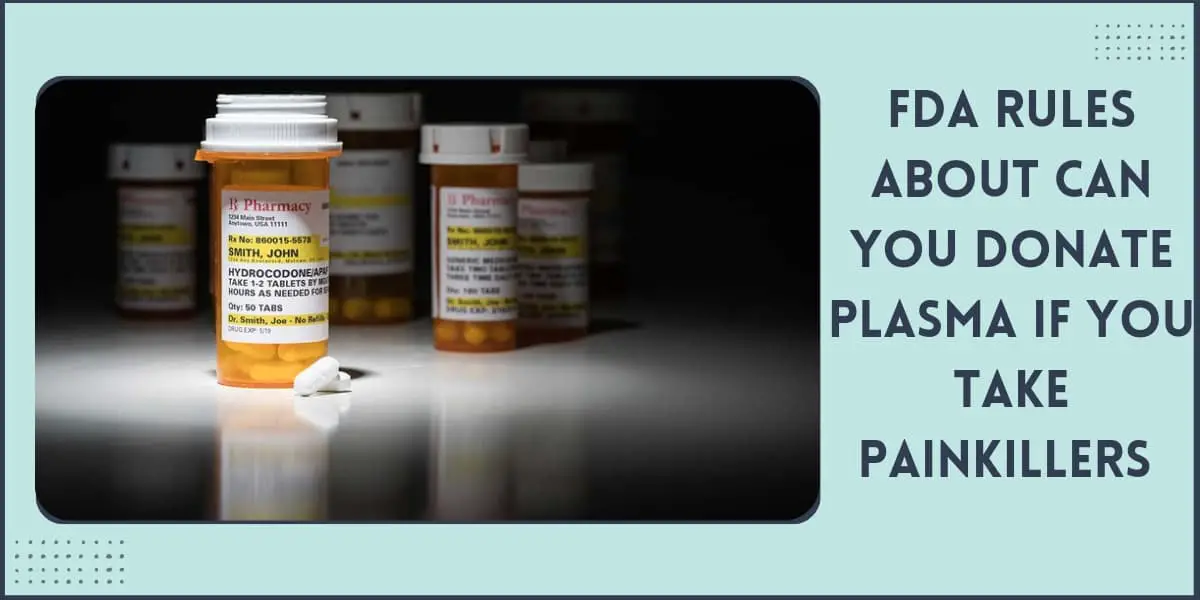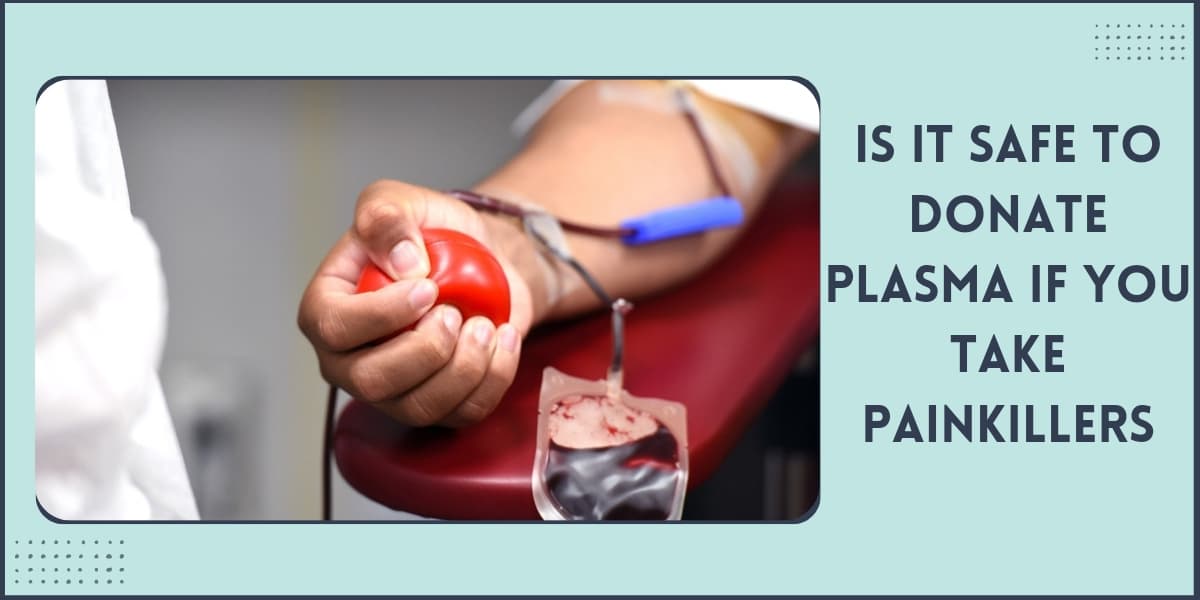
After a skiing accident led to a painkiller prescription, I questioned if I could still be a plasma donor.
So, if you’ve been on a painkiller regimen, but still want to do your part and help others by donating plasma, you are in the right place.
Join me as we dive into this topic, exploring if Can You Donate Plasma if You Take Painkillers, and what you need to know before rolling up your sleeve.
Can You Donate Plasma if You Take Painkillers?
You cannot donate plasma while taking painkillers because they affect the function of blood platelets. However, plasma can be donated if you stop taking them 48 hours before. It is okay to take non-narcotic pain relievers like Paracetamol, Aleve, or OTC pain relievers if you want to donate plasma.
You may also like this article on How Much Does Immunotek Pay for Plasma Donation?

FDA Rules About Can You Donate Plasma if You Take Painkillers
These are the FDA Rules About Can You Donate Plasma if You Take Painkillers:
- If you are taking painkillers for severe health issues, you can not donate plasma.
- Ensure you do not take any painkillers for at least 48 hours before donating plasma.
- If you are using narcotic painkillers or pain relievers that contain ibuprofen, avoid donating plasma until your system is free of it.
- You can donate plasma if you use non-narcotic or OTC pain relievers. However, do so after 24 hours of not taking them.
Is It Safe to Donate Plasma if You Take Painkillers?

Depending on the type of painkillers one is on, it might not be safe to donate plasma. When taking Painkillers that are narcotic or contain ibuprofen, it is advisable not to donate plasma as there are risks of life threatening issues. The plasma donated can also cause adverse reactions in the receiver.
What Are the Risks of Donating Plasma if You Take Painkillers
Some of the risks of donating plasma if you are taking painkillers (especially narcotic ones) are:
- Slowed Down Blood Clotting: some painkillers contain ibuprofen which slows down blood clotting. This is risky because if the donor or receiver has an injury with ibuprofen in their bloodstream, the time of healing will be delayed putting them at risk of infections.
- Severe Bleeding: the contents of some painkillers like advil may lead to over bleeding as a result of reduced blood clotting. This can be harmful to both the donor and receiver in case of injury occurrence.
- Allergies: some individuals may be allergic to some components of certain painkillers which can lead to reactions ranging from mild to severe when they receive plasma from individuals on such painkillers.
- Possible Heart Attack: ibuprofen contained in some painkillers can increase the risk of heart attacks or stroke in individuals with or without heart issues. When plasma is donated from an individual with ibuprofen in their bloodstream, it can have adverse effects on the heart condition of the receiver.
- Over the counter painkillers like advil can inhibit plasma from working properly in the receiver’s body.
- Kidney Damage Risk: In cases where the plasma receiver is under blood pressure medications, if the plasma donor is on painkillers containing motrin IB, it can cause permanent kidney damage to the receiver.
- Some painkillers have side effects like dizziness, vomiting, stomach pain, and so on. Donating plasma while on painkillers could increase the risk of these side effects which can be very dangerous.
- Some painkillers like thalomid can cause skin rashes and low blood calcium levels which can be harmful to the health of the receiver.
- Hair Loss: Aubagio is a painkiller with common side effect as hair loss. Donating plasma when taking this medication can cause hair thinning on the receiver considering he/she might have a lower immune system level at the time of receiving the plasma.
How Long Should I Wait to Donate Plasma After Taking Painkillers?
You should wait at least 72 hours after taking aspirin or aspirin-containing medications before donating plasma.
However, it’s crucial to remember that certain medications may still exclude you from donating blood, platelets, or plasma.
Painkillers that Do Not Have Adverse Effects on Plasma Donation
These painkillers do not have adverse effects on Plasma Donation:
- Paracetamol.
- Naproxen.
- Pregabalin.
- Duloxetine.
- Panadol.
Painkillers that Can Affect Plasma Donation
Below is a list of painkillers that can have major effects on plasma donation:
- Thalomid.
- Erivedge.
- Odomzo.
- Aubagio.
- Rinvoq.
- Advil.
- Motrin IB.
Factors that Disqualifies You from Donating Plasma
Some qualities that can disqualify you from donating plasma are stated below:
If you:
- Are below age 17.
- Weigh less than 100 to 110 pounds or being over weight.
- Have health issues.
- Have traveled out of the country in the last 28 days.
- Have taken antibiotics in the last 72 hours before donation of plasma.
- Are not free from dental procedures for at least 48 hours.
- Have taken any aspirin or drugs containing aspirin like Feldene, anacin. And Excedrin in the last 48 hours.
- Have lived outside the US for over 5 years.
- Have tattoos. Except in cases where it was done in a state regulated facility.
- Are a female donor who has had a life birth.
- Have iron deficiency.
- Have a medical condition.
Check out this post on Can You Donate Plasma if You Take Adderall.
FAQs on Can You Donate Plasma if You Take Painkillers
These are the frequently asked questions on Can You Donate Plasma if You Take Painkillers:
Can I donate plasma if I’m taking over-the-counter painkillers like ibuprofen or acetaminophen?
Generally, over-the-counter painkillers like ibuprofen and acetaminophen do not disqualify you from donating plasma.
Can I Donate Plasma if I Took Tylenol?
You can donate plasma if I took Tylenol because it is a non-narcotic paracetamol that does not affect your blood platelets.
Can I donate plasma if I’m taking painkillers for a temporary condition, such as an injury?
Depending on the type of painkiller and the plasma center’s guidelines, you may be able to donate plasma once you have recovered from the injury and are no longer taking pain medication.
How can I find out if my painkillers will disqualify me from donating plasma?
The best way to find out is to contact your local plasma donation center and discuss your situation with the staff.
Conclusion
Plasma donation can help in saving lives. However, it is important to make donations that won’t further harm the patient and follow the FDA rules.
So, if you are asking the question “Can you donate plasma if you take painkillers? Then the answer is: if under prolonged use of painkillers that are narcotic or contain ibuprofen, do not donate plasma. In other cases, ensure you do not take the painkillers for at least 48 hours before donating plasma.
